

MONDAY, April 18, 2016 (HealthDay News) -- Metformin, the most frequently prescribed standalone drug for type 2 diabetes, is better for the heart than its closest competitors, a large analysis suggests.
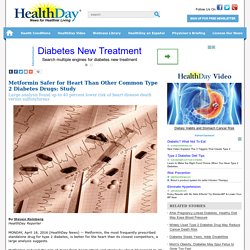
Metformin reduced the risk of dying from heart attack and stroke by about 30 percent to 40 percent compared with other commonly used drugs called sulfonylureas, such as glibenclamide, glimepiride, glipizide and tolbutamide, researchers report. "Pharmaceutical companies continue to make new drugs to reduce blood sugar and improve on safety concerns of the older drugs," said senior study author Dr. Shari Bolen. But, "while adults with diabetes often need more than one medication to control blood sugar, the newer medications do not appear to be safer than the older drugs," added Bolen. Metformin is still the safest and most effective type 2 diabetes medication, said Bolen.
The findings in this latest study aren't surprising, said Dr. The Lie That's Killing Us: Pre-Diabetes. Diabetes Advocates. Time For Diabetes UK To Unplug Ears and Respond To Chorus Of Disapproval Demanding U-Turn. By Jane Feinmann How much longer can the charity Diabetes UK continue to provide advice on diet to the UK’s 3.9 million people with type 2 diabetes that is based on the discredited Seven Countries Study carried out by Ancel Keys back in the 1950/1960s?
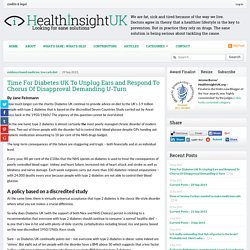
The urgency of this question cannot be overstated. On the one hand, type 2 diabetes is almost certainly the most poorly managed chronic disorder of modern times. Two out of three people with the disorder fail to control their blood glucose despite GPs handing out diabetic medication amounting to 10 per cent of the NHS drugs budget. NO LOW-CARB FOR YOU! « Eathropology. I am emerging (briefly) from grad school hibernation–my husband jokes that I’m taking all my classes “pass/flail”–for a special cause that hits close to home, even though Jennifer Elliott, a dietitian who has been going the rounds with her various professional organizations and institutions, lives in Australia.
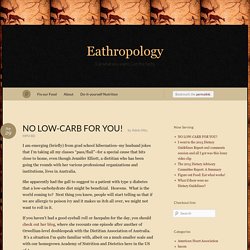
She apparently had the gall to suggest to a patient with type 2 diabetes that a low-carbohydrate diet might be beneficial. Heavens. What is the world coming to? The Low Carb Diabetic. Ruben Alexander by RubenAlexander - Shapeways Shops. Lost 80 lbs, eliminated pre-diabetes and restored my health with LCHF. Diabetes: Type 1 and Type 2. Return to Medical Biochemistry Page © 1996–2014 themedicalbiochemistrypage.org, LLC | info @ themedicalbiochemistrypage.org Diabetes is any disorder characterized by excessive urine excretion.
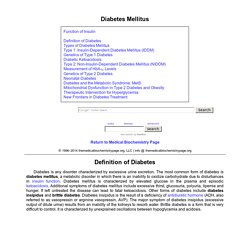
The most common form of diabetes is diabetes mellitus, a metabolic disorder in which there is an inability to oxidize carbohydrate due to disturbances in insulin function. Diabetes mellitus is characterized by elevated glucose in the plasma and episodic ketoacidosis. The Pitfalls of Eating a Moderate Diabetic Diet — T2DCoaching. So your dietitian, nutritionist, diabetic educator, doctor, told you to eat 45-60grams of carbs a meal and to be sure they are complex carbs, low on the Glycemic Index.
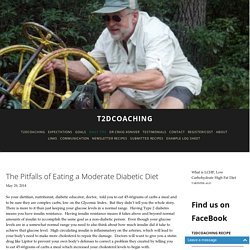
But they didn’t tell you the whole story. There is more to it than just keeping your glucose levels in a normal range. Having Type 2 diabetes means you have insulin resistance. Having insulin resistance means it takes above and beyond normal amounts of insulin to accomplish the same goal as a non-diabetic person. Even though your glucose levels are in a somewhat normal range you need to also think about how much insulin did it take to achieve that glucose level. Man has evolved to store energy as saturated fat, we don’t store fat in the liquid form like canola oil, that would be difficult when running from a wild beast controlling those swinging bags of oil. If you want to reduce your inflammation, meaning you want to reduce your insulin, you have to reduce the amount of carbohydrates you consume on a daily basis.
Low-carb diet linked to improved quality of life, less bodily pain. Indian Foods: AAPI's Guide to Nutrition, Health and Diabetes - Page 2. Dietary carbohydrate restriction in type 2 diabetes mellitus and metabolic syndrome: time for a critical appraisal. The epidemic of diabetes continues unabated, and impassioned calls for better treatment and prevention strategies are common features of scientific conferences.
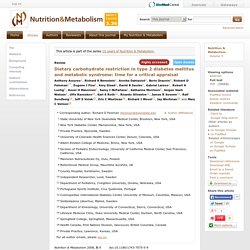
While it is generally acknowledged that total dietary carbohydrate is the major factor in glycemic control, strategies based on reduction of dietary carbohydrate have received little support. The American Diabetes Association, for example, has traditionally recommend against low carbohydrate diets (less than 130 g/day[1]; while the most recent guidelines [2] admit such diets as an alternative approach to weight loss, they continue to emphasize concerns and downplay benefits. Similarly, the Diabetes and Nutrition Study Group of the European Association for the Study of Diabetes [3] reported "no justification for the recommendation of very low carbohydrate diets in persons with diabetes.
" While low carbohydrate diets may not be appropriate for everyone, choices should be left to individual physicians and patients. Dietary Carbohydrate restriction as the first approach in diabetes management. Critical review and evidence base. <div class="msgBox" style="margin-top:10px;"><span class="errMsg"><div>JavaScript is disabled on your browser.
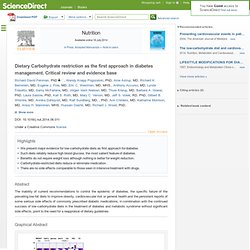
Please enable JavaScript to use all the features on this page. </div></span></div><br /> Received 18 April 2014, Revised 28 June 2014, Accepted 28 June 2014, Available online 16 July 2014 DOI: 10.1016/j.nut.2014.06.011. Glu : Our Journey with the Low Carb Diet and the (Manual) Artificial Pancreas. My son, David, was diagnosed with type 1 diabetes in March 2013.
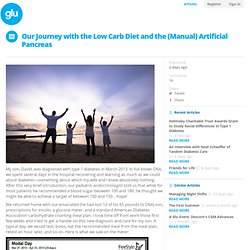
In full-blown DKA, we spent several days in the hospital recovering and learning as much as we could about diabetes—something about which my wife and I knew absolutely nothing. After this very brief introduction, our pediatric endocrinologist told us that while for most patients he recommended a blood sugar between 100 and 180, he thought we might be able to achieve a target of between 100 and 150…hope! Type 1 diabetes Tests and diagnosis.
In June 2009, an international committee of experts from the American Diabetes Association, the European Association for the Study of Diabetes and the International Diabetes Federation recommended that type 1 diabetes testing include the: Glycated hemoglobin (A1C) test.
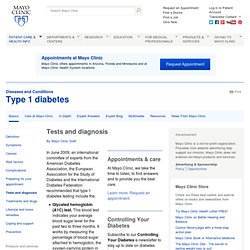
This blood test indicates your average blood sugar level for the past two to three months. It works by measuring the percentage of blood sugar attached to hemoglobin, the oxygen-carrying protein in red blood cells. The higher your blood sugar levels, the more hemoglobin you'll have with sugar attached. An A1C level of 6.5 percent or higher on two separate tests indicates you have diabetes. How to Lower Your Blood Sugar. Over the past decade and a half thousands of people with Type 2 diabetes have dramatically lowered their blood sugar using this very simple technique which was first published on the alt.support.diabetes newsgroup.

Unlike most other strategies you may have encountered, this one does not tell you what to eat. Instead it teaches you how the meals you are currently eating affect your blood sugar and then guides you through the process of adapting those meals so that they will be more blood sugar friendly. Try it for a week and you'll see how well it works. Diabetes Education Online. Diapedia, The Living Textbook of Diabetes. The uses of metabolic adversity - Pogozelski_ASBMBtoday_metabolic_adversity. Carbohydrate Counting 101. Think skinny people don’t get type 2 diabetes? Think again. In the last article we discussed the complex relationship between body weight and type 2 diabetes (T2DM).
We learned that although obesity is strongly associated with T2DM, a subset of “metabolically healthy obese” (MHO) people have normal blood sugar and insulin sensitivity and don’t ever develop diabetes. In this article we’re going to talk about the mirror reflection of the MHO: the “metabolically unhealthy nonobese” (MUN). These are lean people with either full-fledged type 2 diabetes or some metabolic dysfunction, such as insulin resistance. You might even be surprised to learn that skinny people can and do get T2DM. They are rarely mentioned in the media, and there isn’t much written about them in the scientific literature.
Remember that one in three type 2 diabetics are undiagnosed. It’s well-known that high blood sugar can precede the development of T2DM for as long as ten years.
Diabetes Warrior. Is a high-carb diet ‘poison’ to diabetics? From The Times London, UK 17 July, 2012 Is a high-carb diet ‘poison’ to diabetics? John Naish. Me and My Diabetes. Carbohydrate Counting 101. Diabetes. Diabet. Diabetes(II) Blood Sugar 101. Dr. Bernstein's Diabetes Solution. Read The Book Online! Click the links below to jump to various excerpts from Dr. Bernstein's Diabetes Solution. Most of the excerpts are more than one page in length and are filled with interesting facts and important knowledge from Dr. Bernstein. Enjoy! Foreword by Frank Vinicor, M.D., M.P.H. Acknowledgments Before & After: 14 Patients Share Their Experiences Much of it in their own words, 14 of Dr. Chap. 1: Diabetes: The Basics Diabetes 101, including the difference between Type I and Type II diabetes. Chap. 16.